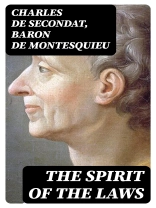The Spirit of the Laws offers a foundational exploration of political philosophy, capturing an array of literary styles from analytical discourse to speculative theory. This anthology engages deeply with the themes of governance, justice, and the interplay of societal structures—demonstrating Montesquieu’s significant influence on legal and political thought. The spectrum of essays presents critical examinations of law’s role within civilization, each piece contributing a unique facet to this grand discourse. Readers will encounter a comprehensive dialogue on the principles defining the nature and operation of laws across cultures and epochs. Montesquieu, a luminary of the Enlightenment, anchors the collection with his incisive intellect and profound insight. His work is emblematic of the period’s intellectual rigor and pushes the boundaries of contemporary political discourse. The anthology is rich with essays reflecting various influences, from Renaissance humanism to Enlightenment rationalism. Collectively, these texts illuminate the dynamism of legal theories and practices that have inspired countless reforms and democratic principles worldwide. This anthology is a must-read for anyone interested in the evolution of systems of power and legislation. The Spirit of the Laws provides a rare opportunity to explore Montesquieu’s diverse intellectual contributions. The collection’s breadth invites readers into a transformative dialogue, revealing the intricate tapestry of ideas that have shaped modern political structures. It stands as a vital resource for those seeking comprehensive insights into the philosophies that govern human societies.
Sobre o autor
Charles de Secondat, Baron de Montesquieu, known simply as Montesquieu, was a French judge, man of letters, and political philosopher. He is best known for his articulation of the theory of separation of powers, which has been implemented in many constitutions throughout the world. He is famous for his influential work, ‘The Spirit of the Laws’ (1748), which is a pioneering analysis on comparative law where he covered topics ranging from law, social life, and the study of anthropology to the various government structures. This book was fundamental in the development of political science and sociology. Montesquieu’s literature often reflects the Enlightenment spirit, characterized by reason, wit, and the promotion of reforms in society. He was also known for his earlier publication ‘Persian Letters’ (1721), which offered a satirical look at European society through the fictional correspondence of two Persian travelers. Montesquieu’s work in ‘The Spirit of the Laws’ not only preceded the establishment of the United States Constitution but also heavily influenced its framers. His clear division of political powers into the legislative, executive, and judicial branches shaped the modern concept of checks and balances in governments across the globe. His ideas on liberty and anti-despotism have cemented his place as a powerful intellectual force during the Age of Enlightenment and continue to resonate within contemporary political discourse.












